Personal Teaching Philosophy: A Guide for Educators
VerifiedAdded on 2020/03/07
|7
|1531
|89
Essay
AI Summary
This essay delves into the author's personal teaching philosophy, shaped by years of experience in early childhood education. It explores the interplay of nature versus nurture in student learning, emphasizing the importance of both innate abilities and environmental influences. The essay outlines the author's goals and objectives, which include fostering student understanding, promoting academic success, and supporting all learners. It defines the roles of an early childhood educator, highlighting the need for flexibility, guidance, and advocacy for children. The author discusses methods for assessing student understanding, the role of technology in education, and the impact of the learning environment. The essay concludes with reflections on the challenges and rewards of teaching, emphasizing the importance of building a strong foundation for young learners. The author believes in creating an environment that supports children's growth and development.
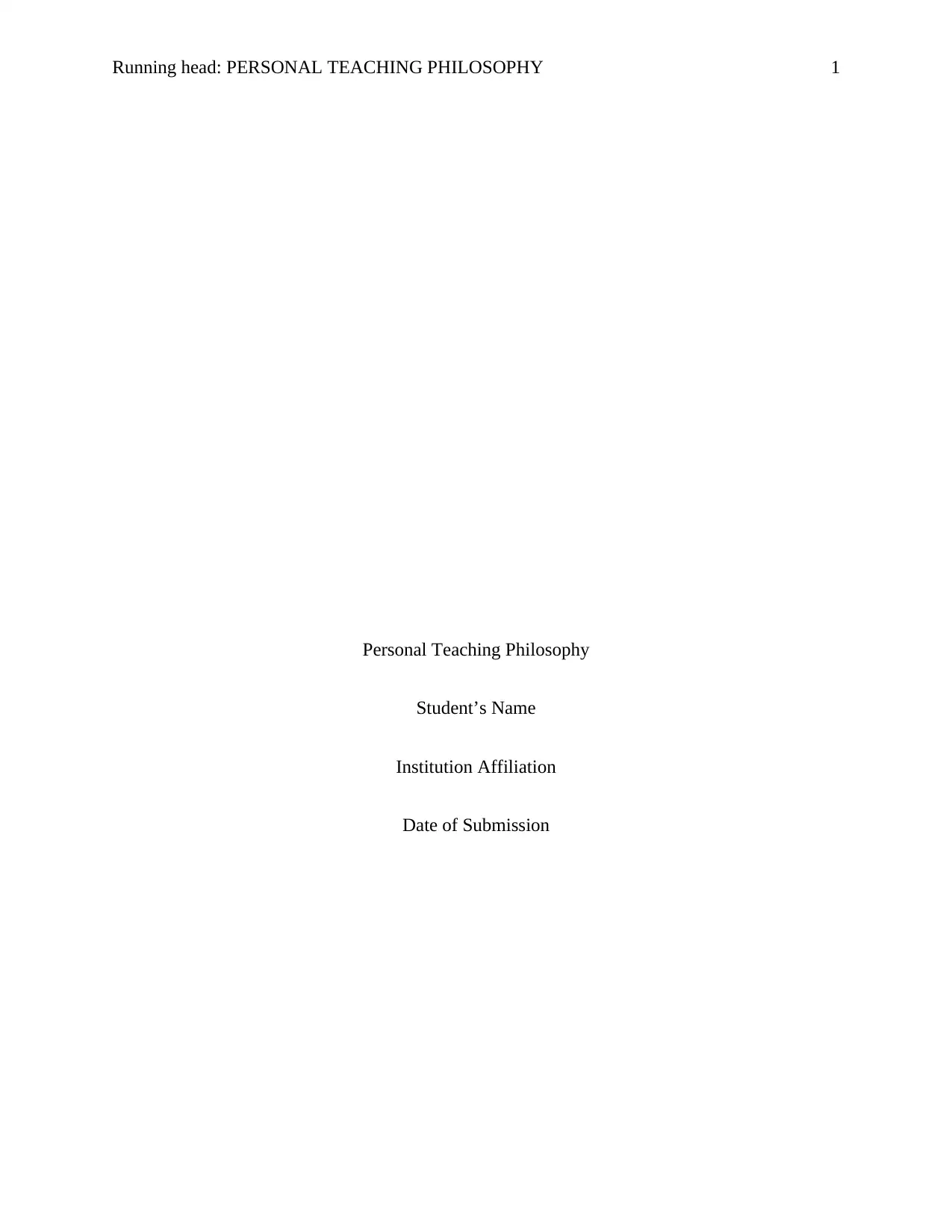
Running head: PERSONAL TEACHING PHILOSOPHY 1
Personal Teaching Philosophy
Student’s Name
Institution Affiliation
Date of Submission
Personal Teaching Philosophy
Student’s Name
Institution Affiliation
Date of Submission
Paraphrase This Document
Need a fresh take? Get an instant paraphrase of this document with our AI Paraphraser
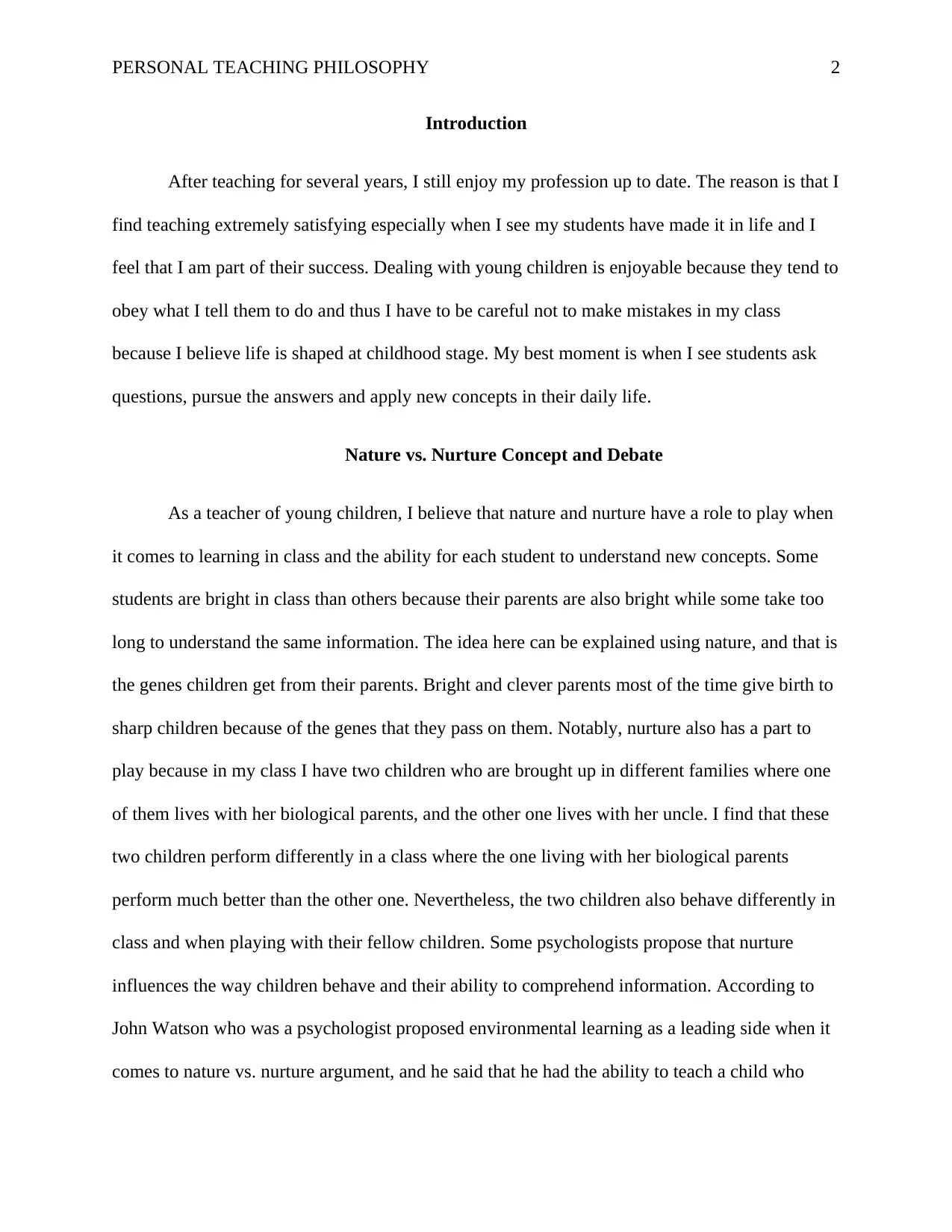
PERSONAL TEACHING PHILOSOPHY 2
Introduction
After teaching for several years, I still enjoy my profession up to date. The reason is that I
find teaching extremely satisfying especially when I see my students have made it in life and I
feel that I am part of their success. Dealing with young children is enjoyable because they tend to
obey what I tell them to do and thus I have to be careful not to make mistakes in my class
because I believe life is shaped at childhood stage. My best moment is when I see students ask
questions, pursue the answers and apply new concepts in their daily life.
Nature vs. Nurture Concept and Debate
As a teacher of young children, I believe that nature and nurture have a role to play when
it comes to learning in class and the ability for each student to understand new concepts. Some
students are bright in class than others because their parents are also bright while some take too
long to understand the same information. The idea here can be explained using nature, and that is
the genes children get from their parents. Bright and clever parents most of the time give birth to
sharp children because of the genes that they pass on them. Notably, nurture also has a part to
play because in my class I have two children who are brought up in different families where one
of them lives with her biological parents, and the other one lives with her uncle. I find that these
two children perform differently in a class where the one living with her biological parents
perform much better than the other one. Nevertheless, the two children also behave differently in
class and when playing with their fellow children. Some psychologists propose that nurture
influences the way children behave and their ability to comprehend information. According to
John Watson who was a psychologist proposed environmental learning as a leading side when it
comes to nature vs. nurture argument, and he said that he had the ability to teach a child who
Introduction
After teaching for several years, I still enjoy my profession up to date. The reason is that I
find teaching extremely satisfying especially when I see my students have made it in life and I
feel that I am part of their success. Dealing with young children is enjoyable because they tend to
obey what I tell them to do and thus I have to be careful not to make mistakes in my class
because I believe life is shaped at childhood stage. My best moment is when I see students ask
questions, pursue the answers and apply new concepts in their daily life.
Nature vs. Nurture Concept and Debate
As a teacher of young children, I believe that nature and nurture have a role to play when
it comes to learning in class and the ability for each student to understand new concepts. Some
students are bright in class than others because their parents are also bright while some take too
long to understand the same information. The idea here can be explained using nature, and that is
the genes children get from their parents. Bright and clever parents most of the time give birth to
sharp children because of the genes that they pass on them. Notably, nurture also has a part to
play because in my class I have two children who are brought up in different families where one
of them lives with her biological parents, and the other one lives with her uncle. I find that these
two children perform differently in a class where the one living with her biological parents
perform much better than the other one. Nevertheless, the two children also behave differently in
class and when playing with their fellow children. Some psychologists propose that nurture
influences the way children behave and their ability to comprehend information. According to
John Watson who was a psychologist proposed environmental learning as a leading side when it
comes to nature vs. nurture argument, and he said that he had the ability to teach a child who
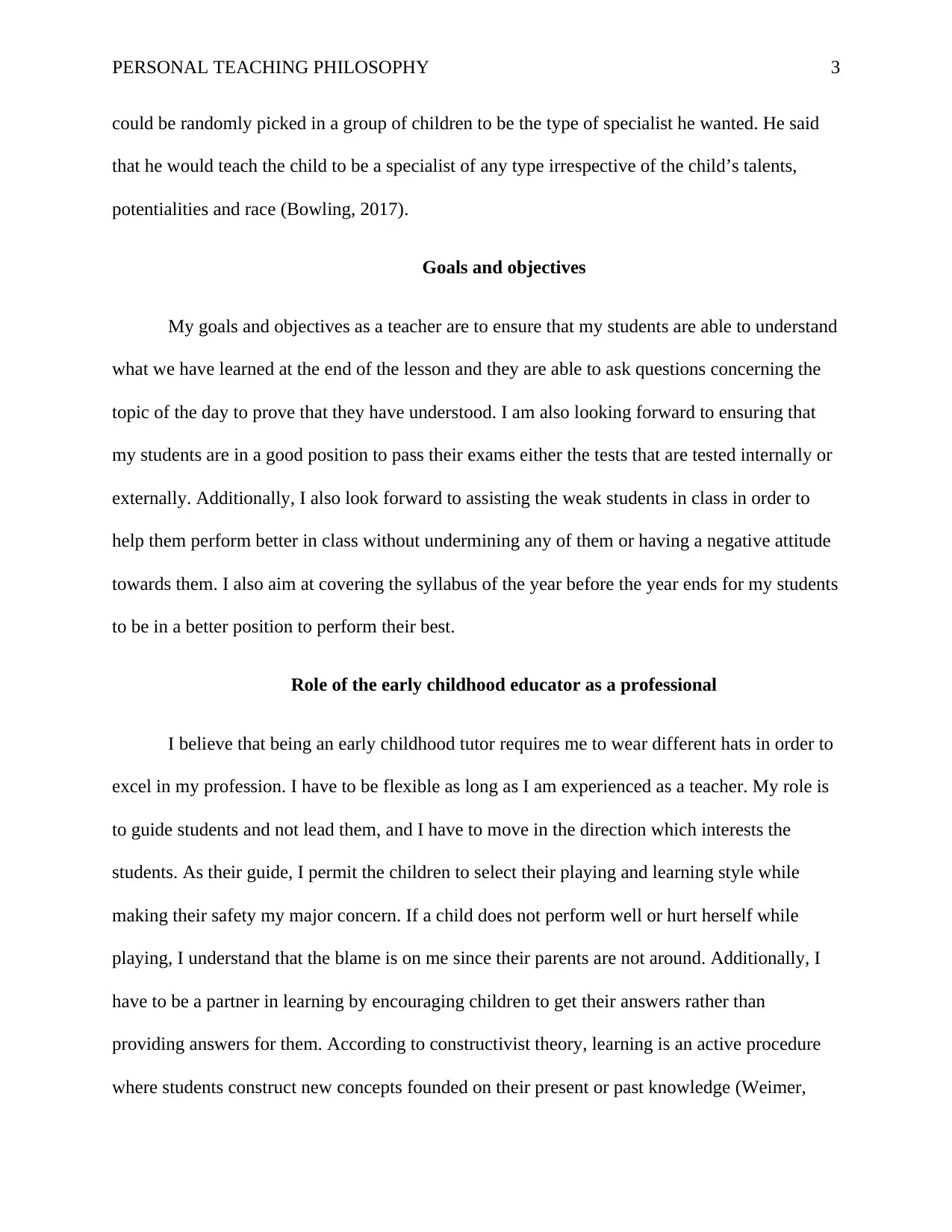
PERSONAL TEACHING PHILOSOPHY 3
could be randomly picked in a group of children to be the type of specialist he wanted. He said
that he would teach the child to be a specialist of any type irrespective of the child’s talents,
potentialities and race (Bowling, 2017).
Goals and objectives
My goals and objectives as a teacher are to ensure that my students are able to understand
what we have learned at the end of the lesson and they are able to ask questions concerning the
topic of the day to prove that they have understood. I am also looking forward to ensuring that
my students are in a good position to pass their exams either the tests that are tested internally or
externally. Additionally, I also look forward to assisting the weak students in class in order to
help them perform better in class without undermining any of them or having a negative attitude
towards them. I also aim at covering the syllabus of the year before the year ends for my students
to be in a better position to perform their best.
Role of the early childhood educator as a professional
I believe that being an early childhood tutor requires me to wear different hats in order to
excel in my profession. I have to be flexible as long as I am experienced as a teacher. My role is
to guide students and not lead them, and I have to move in the direction which interests the
students. As their guide, I permit the children to select their playing and learning style while
making their safety my major concern. If a child does not perform well or hurt herself while
playing, I understand that the blame is on me since their parents are not around. Additionally, I
have to be a partner in learning by encouraging children to get their answers rather than
providing answers for them. According to constructivist theory, learning is an active procedure
where students construct new concepts founded on their present or past knowledge (Weimer,
could be randomly picked in a group of children to be the type of specialist he wanted. He said
that he would teach the child to be a specialist of any type irrespective of the child’s talents,
potentialities and race (Bowling, 2017).
Goals and objectives
My goals and objectives as a teacher are to ensure that my students are able to understand
what we have learned at the end of the lesson and they are able to ask questions concerning the
topic of the day to prove that they have understood. I am also looking forward to ensuring that
my students are in a good position to pass their exams either the tests that are tested internally or
externally. Additionally, I also look forward to assisting the weak students in class in order to
help them perform better in class without undermining any of them or having a negative attitude
towards them. I also aim at covering the syllabus of the year before the year ends for my students
to be in a better position to perform their best.
Role of the early childhood educator as a professional
I believe that being an early childhood tutor requires me to wear different hats in order to
excel in my profession. I have to be flexible as long as I am experienced as a teacher. My role is
to guide students and not lead them, and I have to move in the direction which interests the
students. As their guide, I permit the children to select their playing and learning style while
making their safety my major concern. If a child does not perform well or hurt herself while
playing, I understand that the blame is on me since their parents are not around. Additionally, I
have to be a partner in learning by encouraging children to get their answers rather than
providing answers for them. According to constructivist theory, learning is an active procedure
where students construct new concepts founded on their present or past knowledge (Weimer,
⊘ This is a preview!⊘
Do you want full access?
Subscribe today to unlock all pages.

Trusted by 1+ million students worldwide
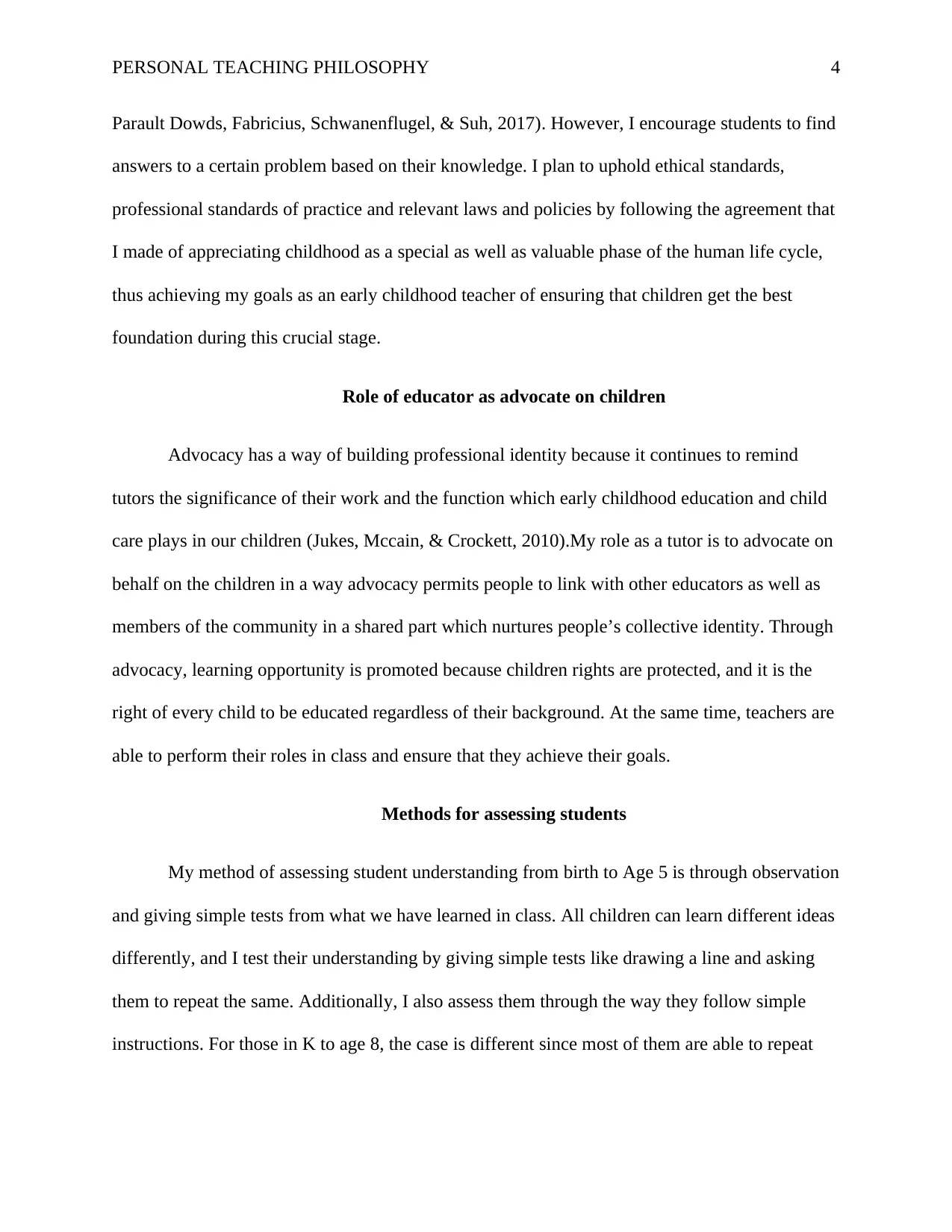
PERSONAL TEACHING PHILOSOPHY 4
Parault Dowds, Fabricius, Schwanenflugel, & Suh, 2017). However, I encourage students to find
answers to a certain problem based on their knowledge. I plan to uphold ethical standards,
professional standards of practice and relevant laws and policies by following the agreement that
I made of appreciating childhood as a special as well as valuable phase of the human life cycle,
thus achieving my goals as an early childhood teacher of ensuring that children get the best
foundation during this crucial stage.
Role of educator as advocate on children
Advocacy has a way of building professional identity because it continues to remind
tutors the significance of their work and the function which early childhood education and child
care plays in our children (Jukes, Mccain, & Crockett, 2010).My role as a tutor is to advocate on
behalf on the children in a way advocacy permits people to link with other educators as well as
members of the community in a shared part which nurtures people’s collective identity. Through
advocacy, learning opportunity is promoted because children rights are protected, and it is the
right of every child to be educated regardless of their background. At the same time, teachers are
able to perform their roles in class and ensure that they achieve their goals.
Methods for assessing students
My method of assessing student understanding from birth to Age 5 is through observation
and giving simple tests from what we have learned in class. All children can learn different ideas
differently, and I test their understanding by giving simple tests like drawing a line and asking
them to repeat the same. Additionally, I also assess them through the way they follow simple
instructions. For those in K to age 8, the case is different since most of them are able to repeat
Parault Dowds, Fabricius, Schwanenflugel, & Suh, 2017). However, I encourage students to find
answers to a certain problem based on their knowledge. I plan to uphold ethical standards,
professional standards of practice and relevant laws and policies by following the agreement that
I made of appreciating childhood as a special as well as valuable phase of the human life cycle,
thus achieving my goals as an early childhood teacher of ensuring that children get the best
foundation during this crucial stage.
Role of educator as advocate on children
Advocacy has a way of building professional identity because it continues to remind
tutors the significance of their work and the function which early childhood education and child
care plays in our children (Jukes, Mccain, & Crockett, 2010).My role as a tutor is to advocate on
behalf on the children in a way advocacy permits people to link with other educators as well as
members of the community in a shared part which nurtures people’s collective identity. Through
advocacy, learning opportunity is promoted because children rights are protected, and it is the
right of every child to be educated regardless of their background. At the same time, teachers are
able to perform their roles in class and ensure that they achieve their goals.
Methods for assessing students
My method of assessing student understanding from birth to Age 5 is through observation
and giving simple tests from what we have learned in class. All children can learn different ideas
differently, and I test their understanding by giving simple tests like drawing a line and asking
them to repeat the same. Additionally, I also assess them through the way they follow simple
instructions. For those in K to age 8, the case is different since most of them are able to repeat
Paraphrase This Document
Need a fresh take? Get an instant paraphrase of this document with our AI Paraphraser
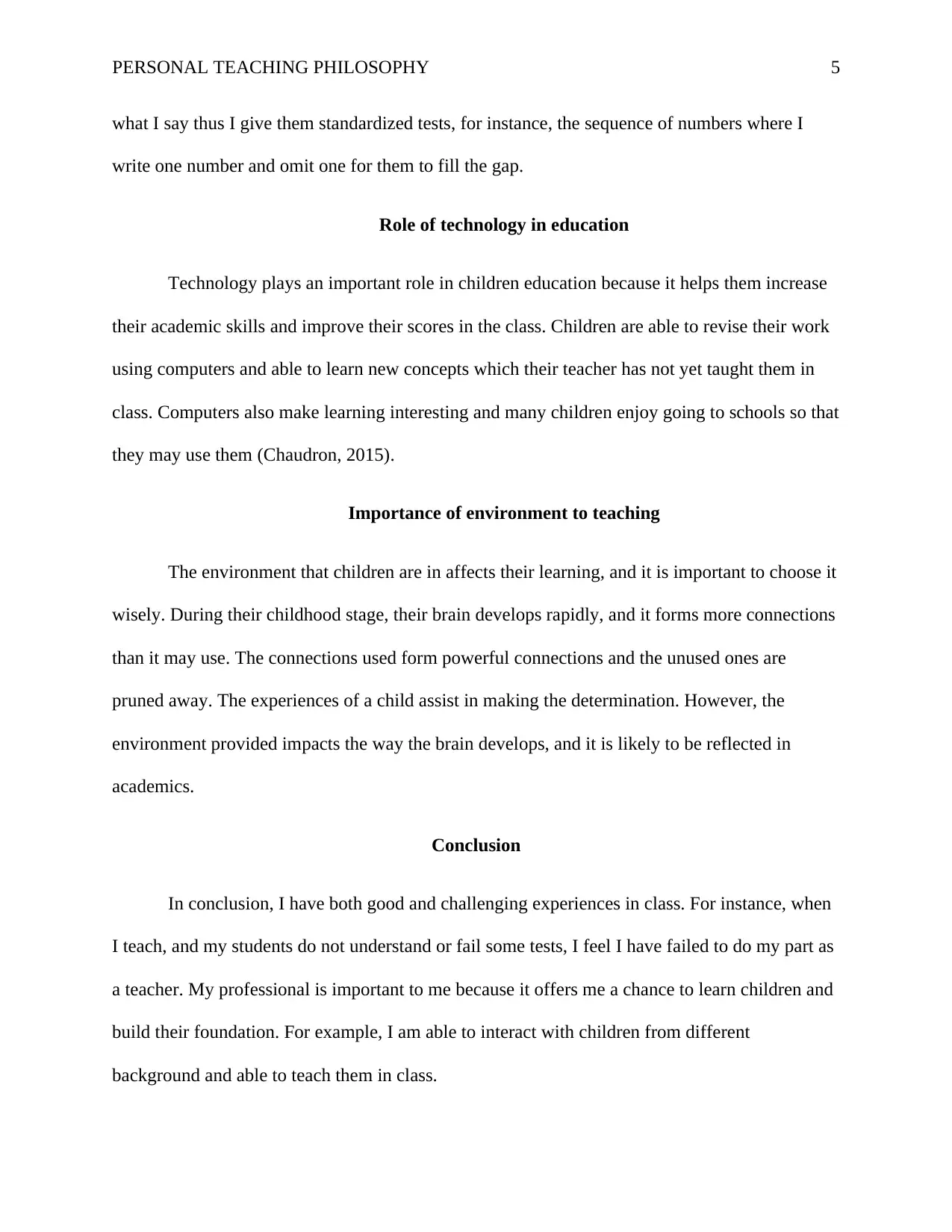
PERSONAL TEACHING PHILOSOPHY 5
what I say thus I give them standardized tests, for instance, the sequence of numbers where I
write one number and omit one for them to fill the gap.
Role of technology in education
Technology plays an important role in children education because it helps them increase
their academic skills and improve their scores in the class. Children are able to revise their work
using computers and able to learn new concepts which their teacher has not yet taught them in
class. Computers also make learning interesting and many children enjoy going to schools so that
they may use them (Chaudron, 2015).
Importance of environment to teaching
The environment that children are in affects their learning, and it is important to choose it
wisely. During their childhood stage, their brain develops rapidly, and it forms more connections
than it may use. The connections used form powerful connections and the unused ones are
pruned away. The experiences of a child assist in making the determination. However, the
environment provided impacts the way the brain develops, and it is likely to be reflected in
academics.
Conclusion
In conclusion, I have both good and challenging experiences in class. For instance, when
I teach, and my students do not understand or fail some tests, I feel I have failed to do my part as
a teacher. My professional is important to me because it offers me a chance to learn children and
build their foundation. For example, I am able to interact with children from different
background and able to teach them in class.
what I say thus I give them standardized tests, for instance, the sequence of numbers where I
write one number and omit one for them to fill the gap.
Role of technology in education
Technology plays an important role in children education because it helps them increase
their academic skills and improve their scores in the class. Children are able to revise their work
using computers and able to learn new concepts which their teacher has not yet taught them in
class. Computers also make learning interesting and many children enjoy going to schools so that
they may use them (Chaudron, 2015).
Importance of environment to teaching
The environment that children are in affects their learning, and it is important to choose it
wisely. During their childhood stage, their brain develops rapidly, and it forms more connections
than it may use. The connections used form powerful connections and the unused ones are
pruned away. The experiences of a child assist in making the determination. However, the
environment provided impacts the way the brain develops, and it is likely to be reflected in
academics.
Conclusion
In conclusion, I have both good and challenging experiences in class. For instance, when
I teach, and my students do not understand or fail some tests, I feel I have failed to do my part as
a teacher. My professional is important to me because it offers me a chance to learn children and
build their foundation. For example, I am able to interact with children from different
background and able to teach them in class.
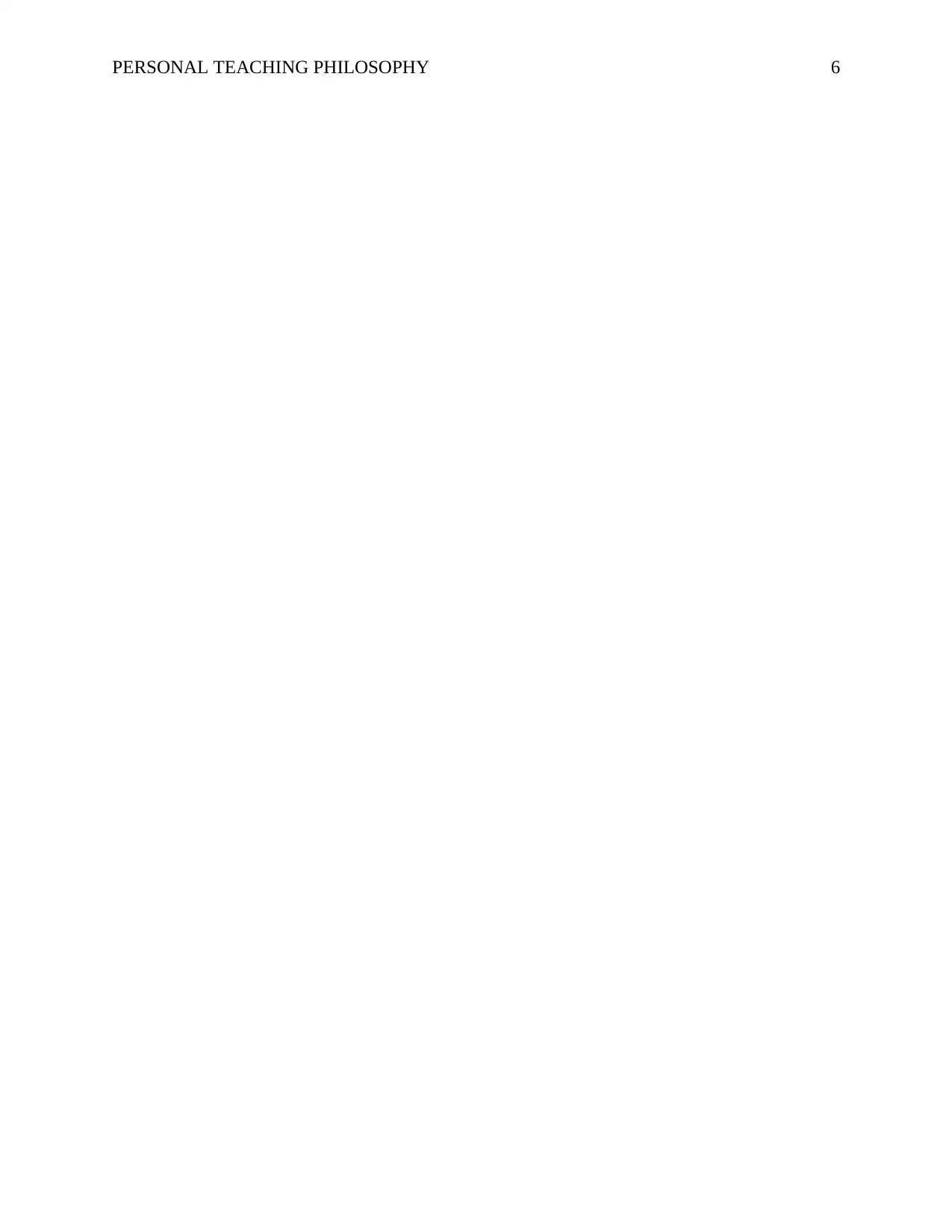
PERSONAL TEACHING PHILOSOPHY 6
⊘ This is a preview!⊘
Do you want full access?
Subscribe today to unlock all pages.

Trusted by 1+ million students worldwide
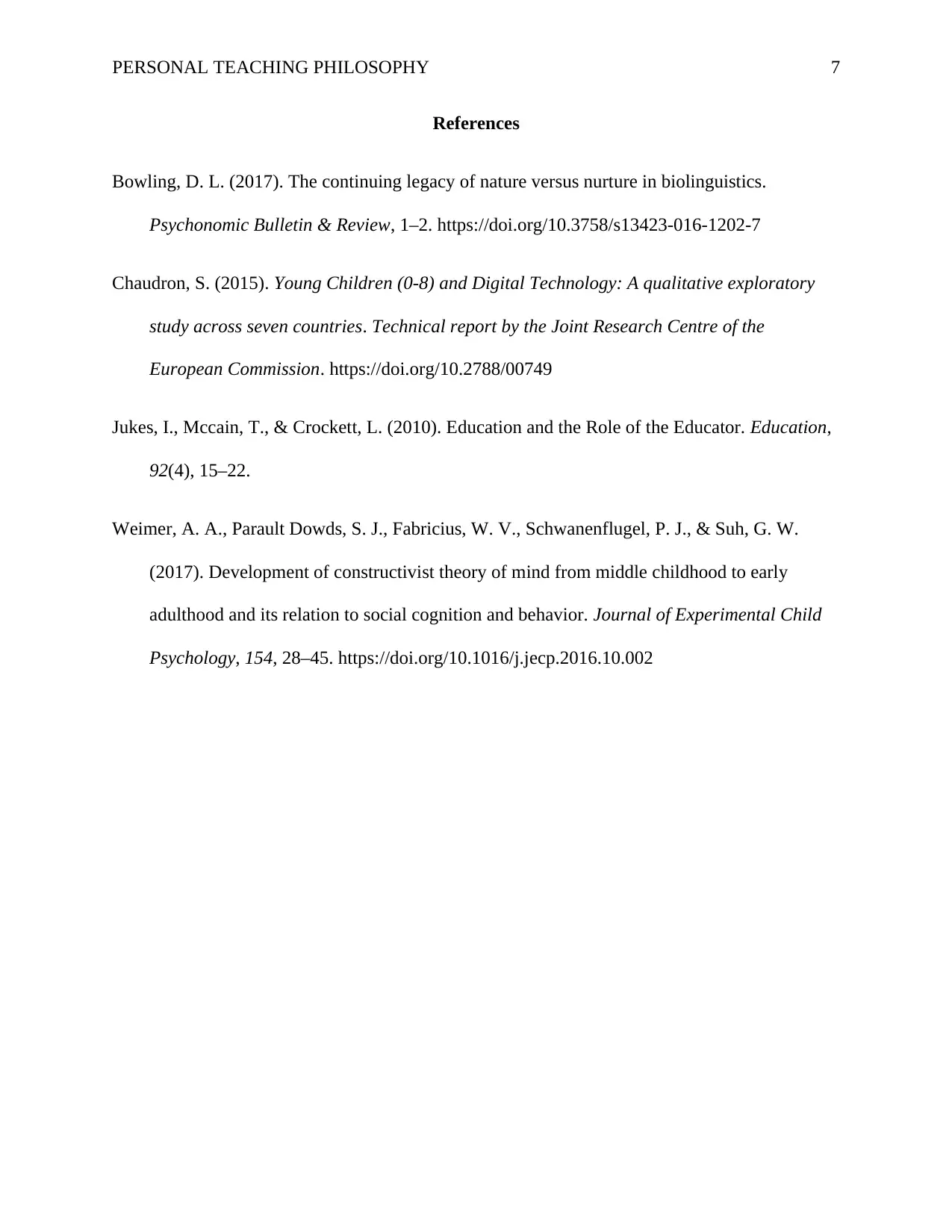
PERSONAL TEACHING PHILOSOPHY 7
References
Bowling, D. L. (2017). The continuing legacy of nature versus nurture in biolinguistics.
Psychonomic Bulletin & Review, 1–2. https://doi.org/10.3758/s13423-016-1202-7
Chaudron, S. (2015). Young Children (0-8) and Digital Technology: A qualitative exploratory
study across seven countries. Technical report by the Joint Research Centre of the
European Commission. https://doi.org/10.2788/00749
Jukes, I., Mccain, T., & Crockett, L. (2010). Education and the Role of the Educator. Education,
92(4), 15–22.
Weimer, A. A., Parault Dowds, S. J., Fabricius, W. V., Schwanenflugel, P. J., & Suh, G. W.
(2017). Development of constructivist theory of mind from middle childhood to early
adulthood and its relation to social cognition and behavior. Journal of Experimental Child
Psychology, 154, 28–45. https://doi.org/10.1016/j.jecp.2016.10.002
References
Bowling, D. L. (2017). The continuing legacy of nature versus nurture in biolinguistics.
Psychonomic Bulletin & Review, 1–2. https://doi.org/10.3758/s13423-016-1202-7
Chaudron, S. (2015). Young Children (0-8) and Digital Technology: A qualitative exploratory
study across seven countries. Technical report by the Joint Research Centre of the
European Commission. https://doi.org/10.2788/00749
Jukes, I., Mccain, T., & Crockett, L. (2010). Education and the Role of the Educator. Education,
92(4), 15–22.
Weimer, A. A., Parault Dowds, S. J., Fabricius, W. V., Schwanenflugel, P. J., & Suh, G. W.
(2017). Development of constructivist theory of mind from middle childhood to early
adulthood and its relation to social cognition and behavior. Journal of Experimental Child
Psychology, 154, 28–45. https://doi.org/10.1016/j.jecp.2016.10.002
1 out of 7
Related Documents
Your All-in-One AI-Powered Toolkit for Academic Success.
+13062052269
info@desklib.com
Available 24*7 on WhatsApp / Email
![[object Object]](/_next/static/media/star-bottom.7253800d.svg)
Unlock your academic potential
Copyright © 2020–2026 A2Z Services. All Rights Reserved. Developed and managed by ZUCOL.





